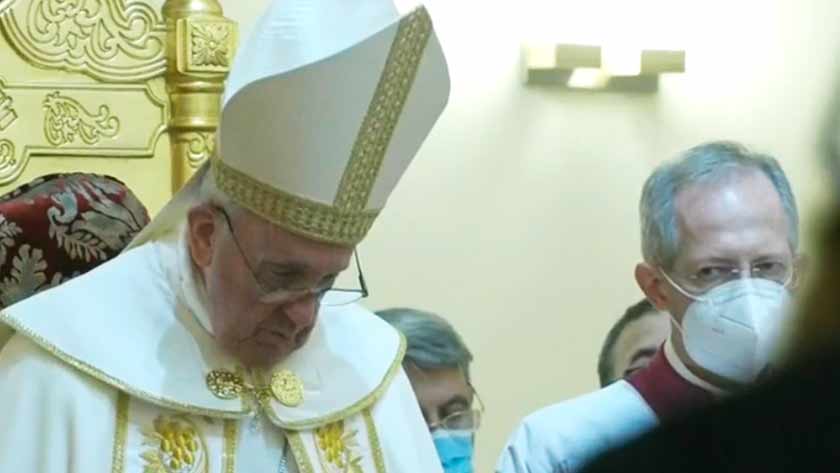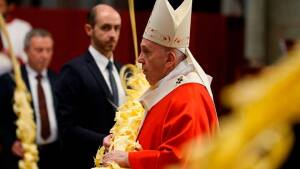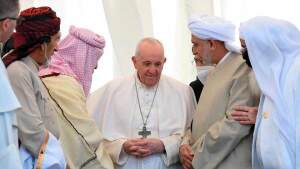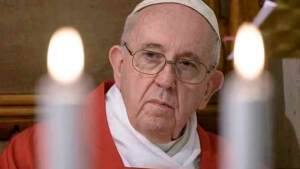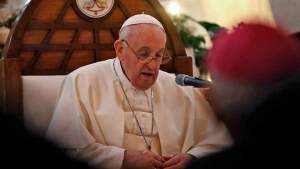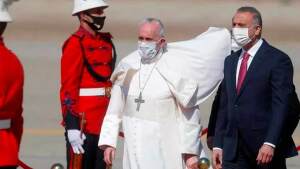Pope Francis: The world is changed by the beatitudes, not by power or force. Homily of Pope Francis at Saint Joseph Cathedral in Baghdad.
Pope Francis: The world is changed by living the Beatitudes.
Baghdad, Iraq - March 6, 2021 - In his homily delivered to the congregation seated inside and outside the Chaldean Catholic Cathedral of St. Joseph in the city of Baghdad on March 6, Pope Francis has told Iraqi Christians that when they suffer discrimination, persecution or war, the Eight Beatitudes are addressed to them. "All that the world takes from us is nothing compared to the tender and patient love with which the Lord fulfills his promises.... This is how the world is changed, not by power or might, but by the beatitudes. Because that is how Jesus did it," Pope Francis said in his homily.
"The beatitudes are for you, for you who are afflicted, who hunger and thirst for justice, who are persecuted. The Lord promises you that your name is written in his heart, written in heaven." According to the Vatican, the service marked the first time Pope Francis celebrated a Eucharistic liturgy, "the Holy Qurbana," in the rite of the Chaldean Church. While Pope Francis recited the prayers in Italian, Cardinal Louis Sako, Chaldean Patriarch, and members of the congregation prayed in Chaldean, a modern form of Aramaic. The Bible readings were in Arabic. Iraqi President Barham Salih and Foreign Minister Fuad Hussein attended the liturgy, which included a prayer for government officials, asking God to help them to be "examples of honesty for the common good" and to "know how to collaborate for a renewed world in which freedom and harmony reign."
Pope Francis´ full homily at the Chaldean Catholic Cathedral of St. Joseph in the city of Baghdad, Iraq.
Saturday, March 6, 2021.
Apostolic Journey of His Holiness Pope Francis to Iraq.
Today the word of God speaks to us of wisdom, witness and promises.
Wisdom in these lands has been cultivated since ancient times. Indeed, the search for wisdom has always attracted men and women. Often, however, those with more means can acquire more knowledge and have greater opportunities, while those who have less are sidelined. Such inequality which has increased in our time is unacceptable. The Book of Wisdom surprises us by reversing this perspective. It tells us that "the lowliest may be pardoned in mercy, but the mighty will be mightily tested" (Wis 6:6). In the eyes of the world, those with less are discarded, while those with more are privileged. Not so for God: the more powerful are subjected to rigorous scrutiny, while the least are God´s privileged ones.
Jesus, who is Wisdom in person, completes this reversal in the Gospel, and he does so with his very first sermon, with the Beatitudes. The reversal is total: the poor, those who mourn, the persecuted are all called blessed. How is this possible? For the world, it is the rich, the powerful and the famous who are blessed! It is those with wealth and means who count! But not for God: It is no longer the rich that are great, but the poor in spirit; not those who can impose their will on others, but those who are gentle with all. Not those acclaimed by the crowds, but those who show mercy to their brother and sisters. At this point, we may wonder: if I live as Jesus asks, what do I gain? Dont I risk letting others lord it over me? Is Jesus invitation worthwhile, or a lost cause? That invitation is not worthless, but wise.
Jesus invitation is wise because love, which is the heart of the Beatitudes, even if it seems weak in the worlds eyes, in fact, always triumphs. On the cross, it proved stronger than sin, in the tomb, it vanquished death. That same love made the martyrs victorious in their trials and how many martyrs have there been in the last century, more even than in the past! Love is our strength, the source of strength for those of our brothers and sisters who here to have suffered prejudice and indignities, mistreatment and persecutions for the name of Jesus. Yet while the power, the glory and the vanity of the world pass away, love remains. As the Apostle Paul told us: "Love never ends" (1 Cor 13:8). To live a life shaped by the Beatitudes, then, is to make passing things eternal, to bring heaven to earth.
But how do we practice the Beatitudes? They do not ask us to do extraordinary things, feats beyond our abilities. They ask for daily witness. The blessed are those who live meekly, who show mercy wherever they happen to be, who are pure of heart wherever they live. To be blessed, we do not need to become occasional heroes, but to become witnesses day after day. Witness is the way to embody the wisdom of Jesus. That is how the world is changed: not by power and might, but by the Beatitudes. For that is what Jesus did: he lived to the end what he said from the beginning. Everything depends on bearing witness to the love of Jesus, that same charity which Saint Paul magnificently describes in todays second reading. Let us see how he presents it.
First, Paul says that "love is patient" (v. 4). We were not expecting this adjective. Love seems synonymous with goodness, generosity and good works, yet Paul says that charity is above all patient. The Bible speaks first and foremost of God´s patience. Throughout history, men and women proved constantly unfaithful to the covenant with God, falling into the same old sins. Yet instead of growing weary and walking away, the Lord always remained faithful, forgave and began anew. This patience to begin anew each time is the first quality of love, because love is not irritable, but always starts over again. Love does not grow weary and despondent, but always presses ahead. It does not get discouraged, but stays creative. Faced with evil, it does not give up or surrender. Those who love to do not close in on themselves when things go wrong, but respond to evil with good, mindful of the triumphant wisdom of the cross. Gods witnesses are like that: not passive or fatalistic, at the mercy of happenings, feelings or immediate events. Instead, they are constantly hopeful because grounded in the love that "bears all things, believes all things, hopes all things, endures all things" (v. 7).
We can ask ourselves: how do we react to situations that are not right? In the face of adversity, there are always two temptations. The first is flight: we can run away, turn our backs, trying to keep aloof from it all. The second is to react with anger, with a show of force. Such was the case of the disciples in Gethsemane: in their bewilderment, many fled and Peter took up the sword. Yet neither flight nor the sword achieved anything. Jesus, on the other hand, changed history. How? With the humble power of love, with his patient witness. This is what we are called to do; and this is how God fulfils his promises.
Promises. The wisdom of Jesus, embodied in the Beatitudes, calls for witness and offers the reward contained in the divine promises. For each Beatitude is immediately followed by a promise: those who practice them will possess the kingdom of heaven, they will be comforted, they will be satisfied, they will see God (cf. Mt 5: 3-12). Gods promises guarantee unrivalled joy and never disappoint. But how are they fulfilled? Through our weaknesses. God makes blessed those who travel the path of their inner poverty to the very end.
This is the way; there is no other. Let us look to the patriarch Abraham. God promised him a great offspring, but he and Sarah are now elderly and childless. Yet it is precisely in their patient and faithful old age that God works wonders and gives them a son. Let us also look to Moses: God promises that he will free the people from slavery, and to do so he asks Moses to speak to Pharaoh. Even though Moses says he is not good with words, it is through his words that God will fulfil his promise. Let us look to Our Lady, who under the Law could not have a child, yet was called to become a mother. And let us look to Peter: he denies the Lord, yet he is the very one that Jesus calls to strengthen his brethren. Dear brothers and sisters, at times we may feel helpless and useless. We should never give in to this because God wants to work wonders precisely through our weaknesses.
God loves to do that, and tonight, eight times, he has spoken to us the word ţūbā [Beatitudes], in order to make us realize that, with him, we truly are "blessed". Of course, we experience trials, and we frequently fall, but let us not forget that, with Jesus, we are blessed. Whatever the world takes from us is nothing compared to the tender and patient love with which the Lord fulfills his promises. Dear sister, dear brother, perhaps when you look at your hands they seem empty, perhaps you feel disheartened and unsatisfied by life. If so, do not be afraid: the Beatitudes are for you. For you, who are afflicted, who hunger and thirst for justice, who are persecuted. The Lord promises you that your name is written on his heart, written in heaven!
Today I thank God with you and for you, because here, where wisdom arose in ancient times, so many witnesses have arisen in our own time, often overlooked by the news, yet precious in Gods eyes. Witnesses who, by living the Beatitudes, are helping God to fulfil his promises of peace.
- End of Pope Francis´ Homily.
The celebration of this Holy Mass was the last public act of a day in which Pope Francis traveled to Najaf, a center of spiritual and political power for Iraqi Shiite Muslims, and then to Ur, the birthplace of Abraham, about 15 kilometers from Nasiriyah. On March 7, he was scheduled to travel to the Iraqi Kurdistan region, where he was to visit Irbil, Mosul and Qaraqosh, cities devastated under the rule of the Islamic State group. There he was scheduled to meet with some of the Christians who have returned to the region to try to rebuild it. Pope Francis´ March 5-8 visit took place under heavy security measures.
About Pope Francis on Iraq.
-
Pope in Iraq: Peace begins with the decision to have no enemies
Pope Francis: The path to peace begins with the decision not to have enemies. It means spending less money on weapons and more on food, education, education
-
Pope arrives in Iraq to promote peace, tolerance and equality
Pope Francis to Iraq: I come as a penitent, asking forgiveness from heaven and from everyone for so much destruction and cruelty. I come as a pilgrim of peace
-
Pope Francis in Iraq: The vaccine against this virus is hope
Pope Francis: The Lord has given us an effective vaccine against this unpleasant virus. It is hope... With this vaccine, we can emerge with renewed strength.
 Qriswell Quero, Venezuelan, faithful husband and father of a family. Electronic engineer and missionary of the faith. Committed to the proclamation of the Gospel. Solid believer that there are always new beginnings. Whoever has God has nothing to stop him.
Qriswell Quero, Venezuelan, faithful husband and father of a family. Electronic engineer and missionary of the faith. Committed to the proclamation of the Gospel. Solid believer that there are always new beginnings. Whoever has God has nothing to stop him.